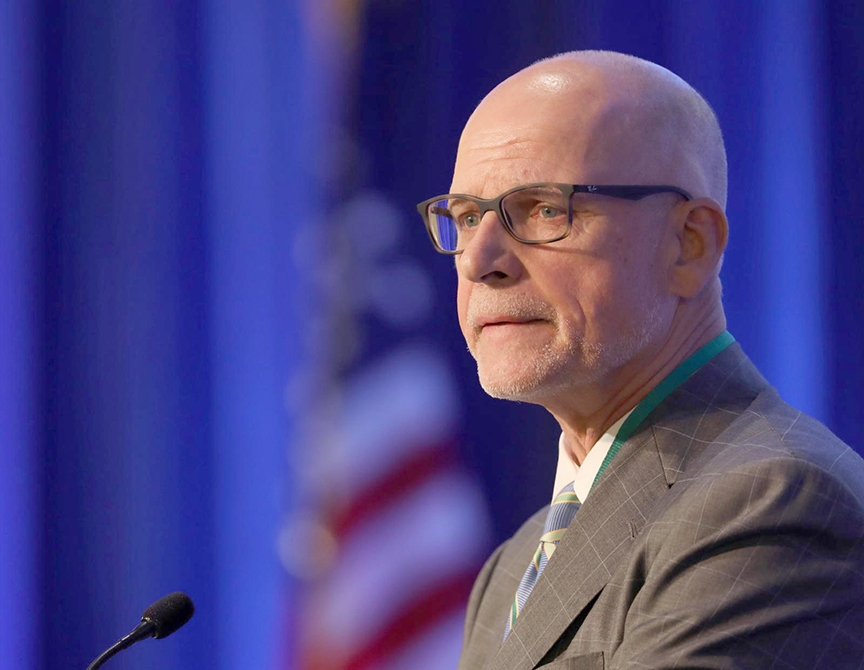
BALTIMORE. Twenty years ago, the big news from the bishops’ general assembly in Dallas was the adoption of the “Charter for the Protection of Children and Young People,” a comprehensive set of procedures for addressing allegations of sexual abuse of minors by Catholic clergy.
This year, at their assembly in Baltimore Nov. 14-17, the bishops acknowledged the charter’s anniversary and said that they have made steps in addressing clergy sexual abuse and would continue to listen, care for, and walk with survivors.
“A debt is owed that can never be truly paid, but we continue to offer our apology and our vigilance,” the U.S. bishops said in a letter to Pope Francis read at the start of the Nov. 15 public session of their meeting.
The letter – read by Father Michael J.K. Fuller, general secretary of the U.S. Conference of Catholic Bishops – acknowledged the 20-year milestone of the charter and said it was written in response to those who had suffered from abuse and felt they had not been heard.
These survivors, the letter said, taught the bishops “how to better protect children and how to better serve survivors.”
This was not the only reference to both the charter and the work still ahead for Church leaders regarding clergy sexual abuse. The first day of the public meeting of bishops ended with a reflection on the 20th anniversary of the Dallas charter and prayer for continued healing.
Mark Joseph Williams, a survivor of clergy sex abuse, who serves as special adviser to Cardinal Joseph W. Tobin of Newark, New Jersey, thanked the bishops for their courage to enact the charter two decades ago.
“I am grateful and encouraged by the work you are doing to rid abuse from our beloved Church,” he said, stressing that the charter was both “necessary and prophetic.”
Williams, a management consultant and forensic social worker, was abused by a priest when he was a child. He told the bishops that many abuse survivors “remain alone, cautious, and cowering in fear.” They need God’s love and need to be accompanied by Church leaders as a synodal church, he added.
In his own experience, he said, he had to “rise from the abuse, the addiction, and the suicidal impulse” to experience a grace that enabled him to forgive his abuser, but not grant exoneration.
Williams urged the bishops to continue an “unwavering commitment to hear the voice of victims and survivors,” and help them on the path toward greater healing, noting that his own healing came from “being heard when I cried out.”
“Thank you for walking with me and all the abused. Thank you,” he said.
The bishops gave him a standing ovation.
After he spoke, Cardinal Tobin told the bishops about meeting with Williams and how he had offered to help address the abuse crisis in a way that would “help survivors and the scandalized faithful.”
The cardinal stressed how Church leaders need to hear from the abused and shared how he has sat silent at times before “a torrent of accusations, insults, and gut-wrenching screams.”
Responding to survivors’ pain as a field hospital, what Pope Francis has called the Church to be in the world, is a way to be an “instrument of grace,” he said.
Bishop James V. Johnston Jr. of Kansas City-St. Joseph, Missouri, outgoing chairman of the Committee on the Protection of Children and Young People, told the bishops the presentation they’d just heard was a reminder of where the Church has been and its continued efforts not to repeat history.
He said the past 20 years have been a time of growth, awareness, examination, and conversion as the Church has worked to provide a safe environment and restore justice.
He apologized to those who have been abused by members of the clergy and thanked survivors for their courage in reporting abuse and “assisting us in better responding to your needs.”
Bishop Johnston said the bishops reaffirm their promise to protect and heal, acknowledging that there is still a lot of pain and hurt. He also said they will continue to follow the path set out in the charter 20 years ago not out of compliance but because “it is our mission.”
The bishops then read aloud a prayer for hope and healing written by abuse survivors.









